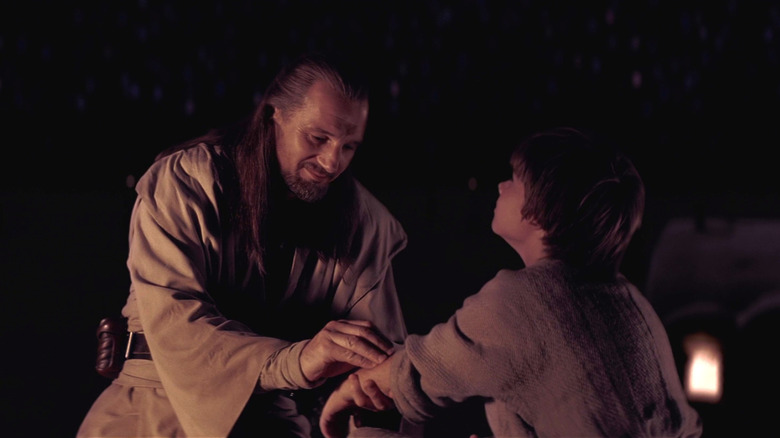What Is M-Count In Star Wars? The Terminology Explained
The third and final season of "The Bad Batch" focuses on the intriguing mystery of why the Empire is so obsessed with something they call "M-Count" and how the clone Omega figures into their plan. Particularly strange is seeing this concept so integral to the show when, once upon a time, it was fans' the most maligned canon addition. Out of the many alien concepts in "Star Wars," and all the things George Lucas came up with — from the Jedi to the Wookies and lightsabers — midi-chlorians remains the most contentious. They are intelligent, microscopic life forms residing within the cells of every living organism in the universe.
It is the midi-chlorians that channel the Force, and allow their host access to it. Because midi-chlorians spring from, and are connected to the Wellspring of Life from which all life and the Force itself comes from, midi-chlorians are believed to be capable of creating life — or so Darth Sidious said his master believed in one of the best scenes in the entire "Star Wars" franchise.
Blood tests can estimate the number of midi-chlorians within a being's cells, a test that was used to determine an individual's potential in the Force during the Republic era before the Jedi Order kidnapped children and forced them to become one of them. This was once controversial, but now is the key to Disney-era "Star Wars."
When midi-chlorians entered the scene
The midi-chlorians weren't mentioned on screen until "The Phantom Menace" was released in 1999 when Qui-Gon tests Anakin's blood for the microorganisms, doing a midi-chlorian count (or M-count) to determine whether he is the Chosen One. This was met with immediate backlash, with fans disliking what they perceived as an over-explaining of the Force, an attempt to turn what was once mystical and spiritual into science.
This, of course, is a very dumb take, because the idea of the midi-chlorians doesn't take away or change the spiritual aspect of the Force. On the contrary, it fits everything George Lucas was trying to say from the beginning. Besides, Lucas always had a tendency to overthink the Force, even if only in his mind. Before the midi-chlorians, there were the Whills. They are another microscopic single celled life form, also known as the will of the Force, which Lucas originally intended to be the narrator of the entire saga.
As Lucas explained in the TV show "James Cameron's Story of Science Fiction," he thought of the Whills as the drivers in the vehicles that are people. "We're vessels for them. And the conduit is the midi-chlorians. The midi-chlorians are the ones who communicate with The Whills. The Whills, in a general sense, they are the Force."
Midi-chlorians and the Whills were so important to Lucas that they were going to be the focus on his original plan for the sequel trilogy, had he not sold Lucasfilm to Disney.
The revenge of the M-count
Despite fans' best efforts to erase midi-chlorians from their memory, the microorganism has become quite important to the "Star Wars" franchise in the Disney era. This started with "The Mandalorian," wherein Grogu, aka Baby Yoda, was meant as a lab rat for former Imperials like Doctor Pershing to do experiments with. Later Moff Gideon was revealed to have dabbled in M-count tests, even achieving the creation of Force-sensitive clones of himself.
"The Bad Batch" is showing the beginnings of that idea, showing the start of the Project Necromancer that has slowly but surely become an important background plot of "The Mandalorian." In "The Bad Batch," we see the nascent Empire's efforts to investigate cloning, and also M-counts. We don't know exactly why — but presumably it has a lot to do with Palpatine's eventual return from the dead. All that being said, fans somehow still mad at the whole existence of the midi-chlorians should stop whining. If Lucas' own text wasn't enough, let the recently released first season of "Ahsoka" be the final nail in the coffin of midi-chlorians ruining the mysticism or the democratization of the Force.
That show challenged our understanding of the Jedi by showing that literally anyone, no matter their M-count, can use the Force if they train hard enough. Just like some people are extraordinarily and naturally gifted at sports or martial arts doesn't mean no one can reach a very high status within those fields by pure training, it just means some have an easier time than others.


